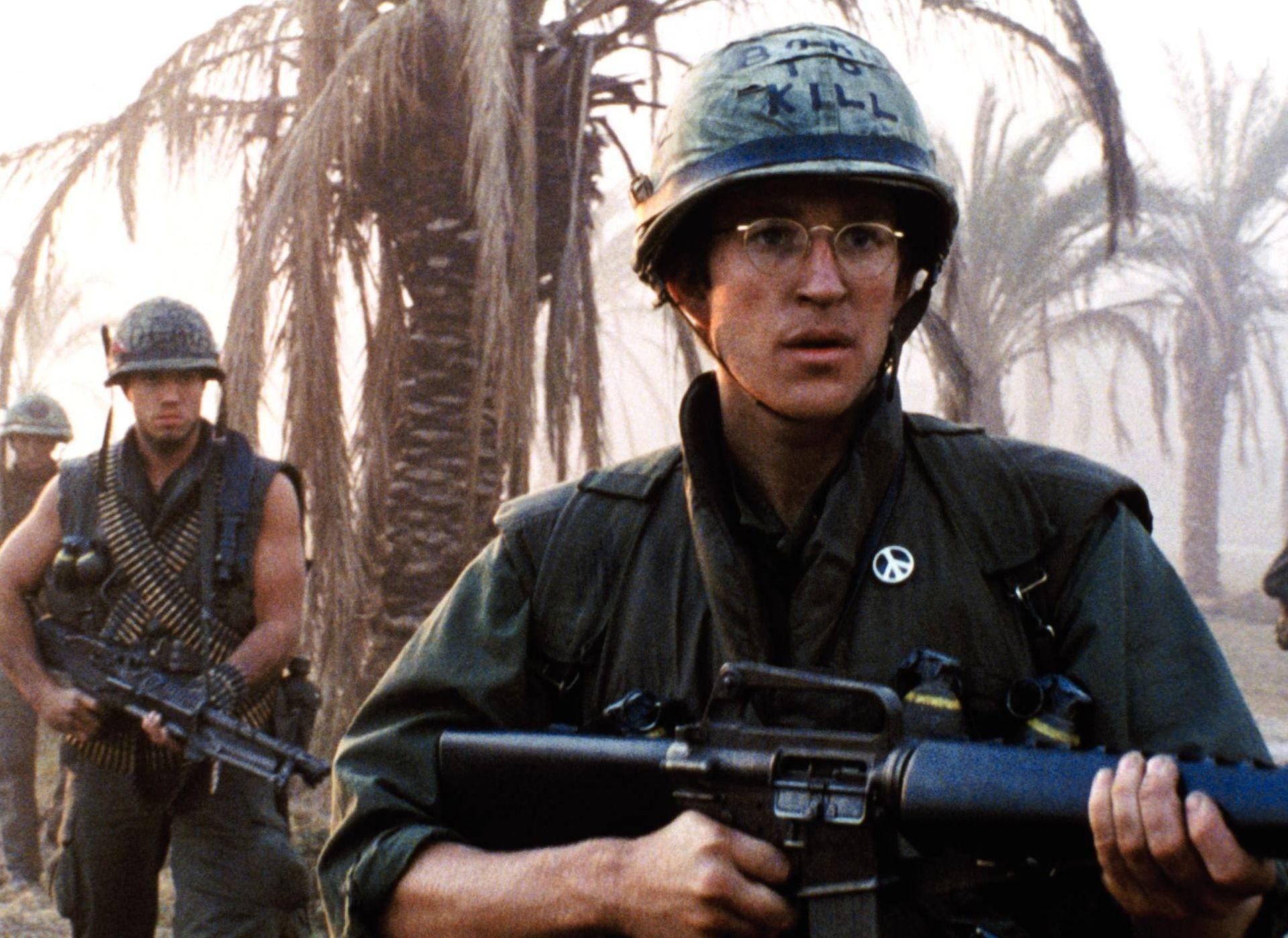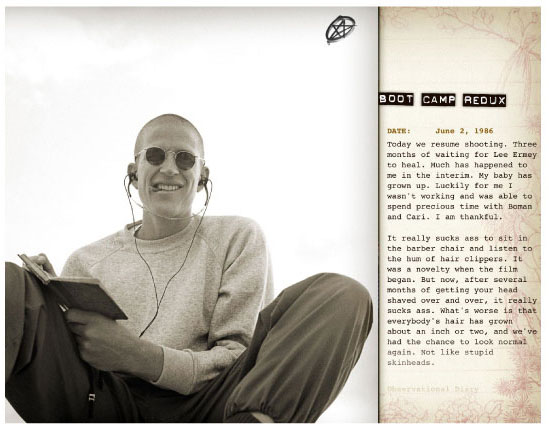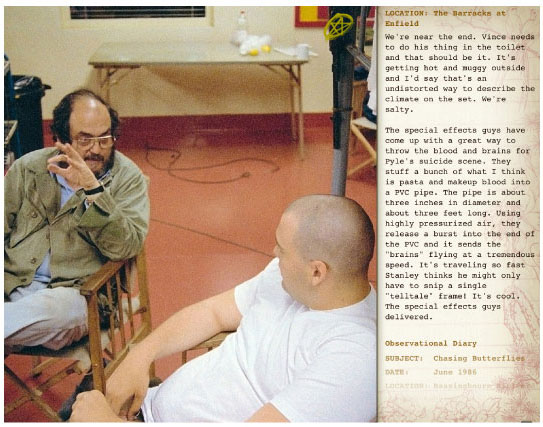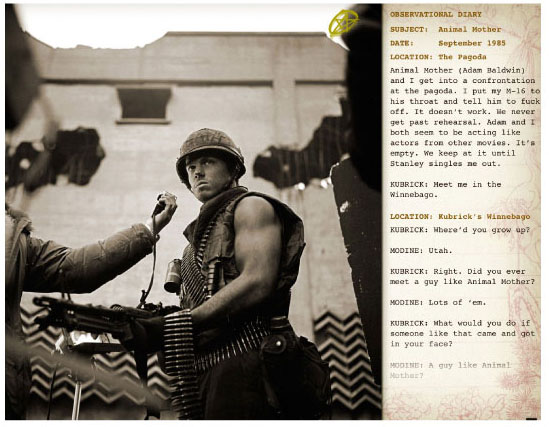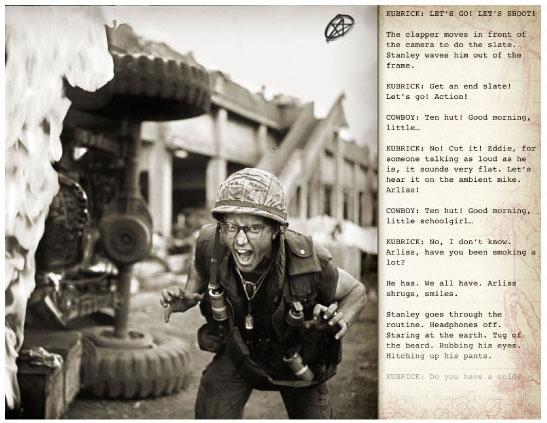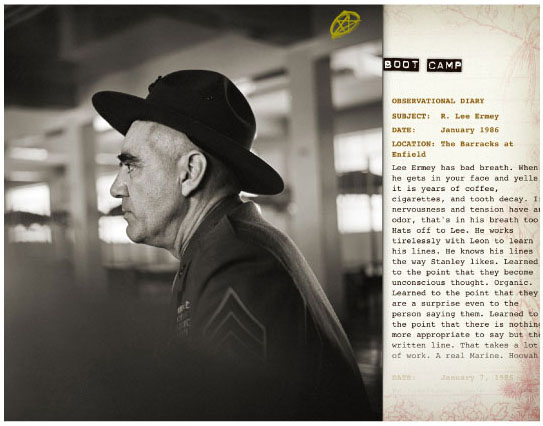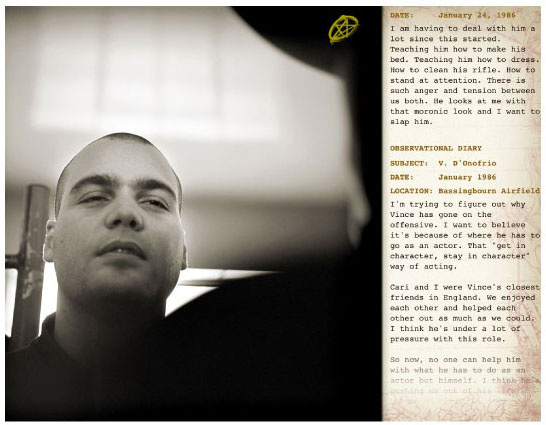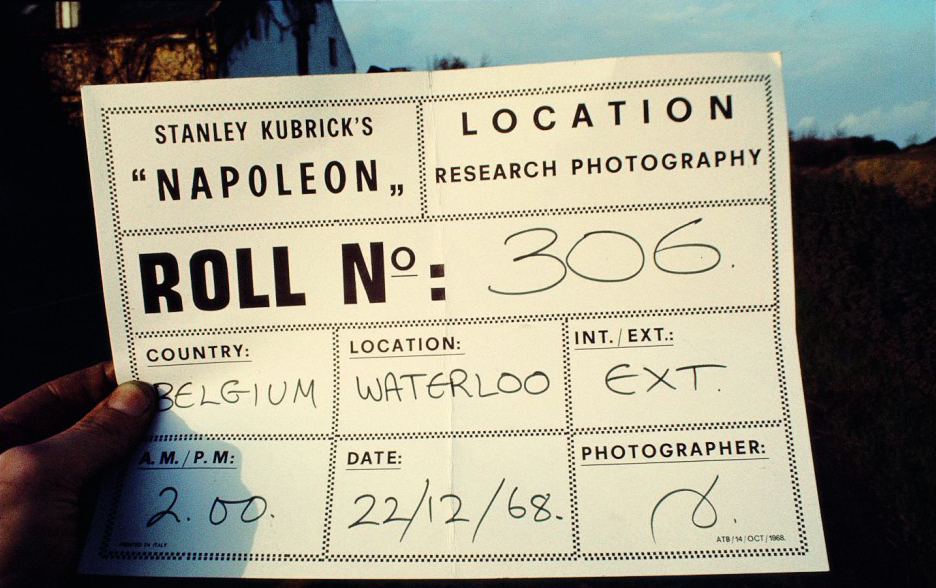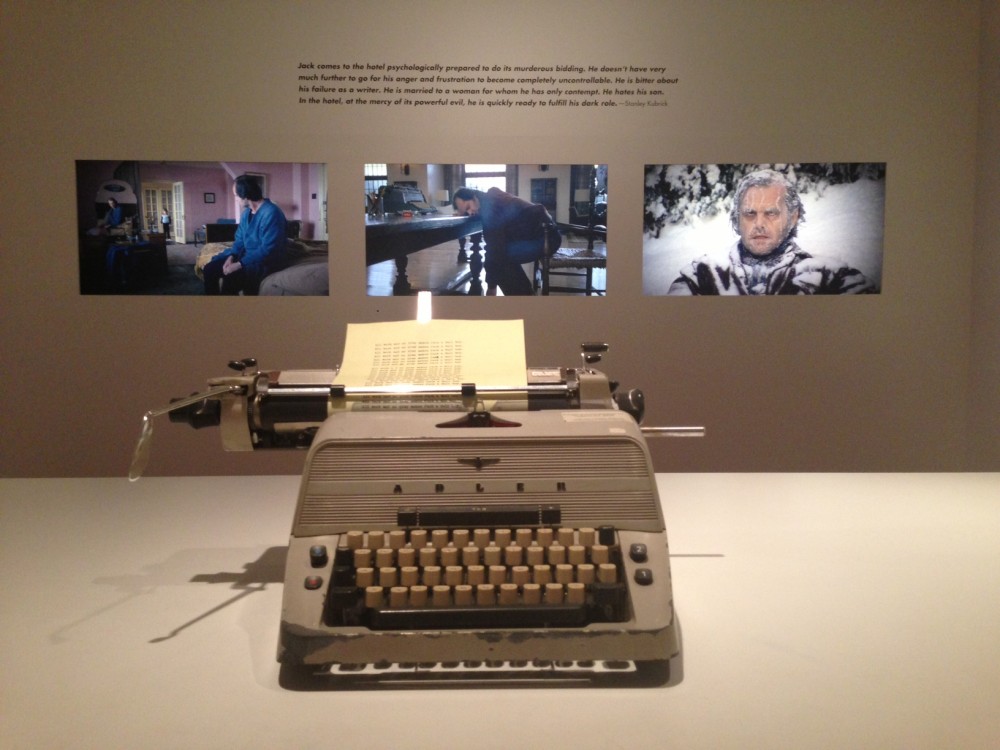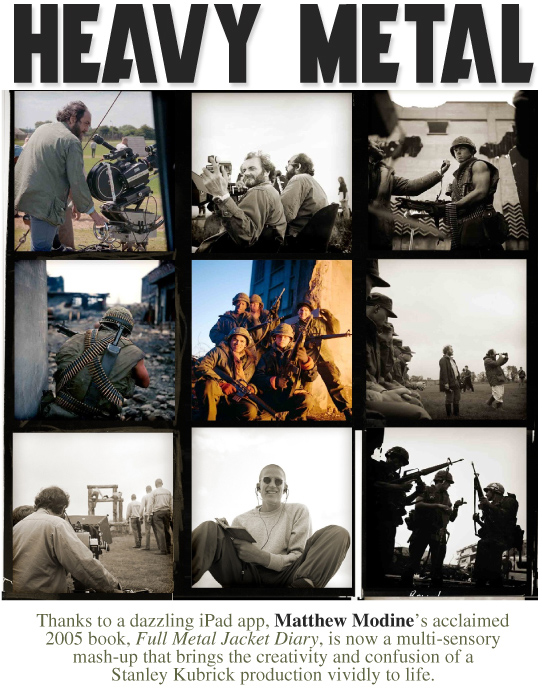
Whatever your opinion of the movies, there’s no disputing that the filmography of Matthew Modine is impressive. A partial list includes collaborations with such marquee directors as Alan Parker, Alan J. Pakula, Robert Altman, Tony Richardson, Jonathan Demme, John Schlesinger, John Sayles, James Ivory, Gillian Armstrong, Spike Lee, Abel Ferrara, Oliver Stone, Mike Figgis, Christopher Nolan and, ofcourse, the alpha and omega of idiosyncratic auteurs, Stanley Kubrick.
When Kubrick cast Modine in his searing Vietnam-era drama Full Metal Jacket, the actor was just twenty-four, and had only been making movies for a few years. But he already had seven films under his belt, including Birdy, The Hotel New Hampshire and Mrs. Soffel. Still, when he scored the Full Metal Jacket role of Pvt. J.T. “Joker” Davis (a role that, as difficult as it is to imagine, almost went to Anthony Michael Hall), Modine knew instinctively that working with Kubrick would be an experience like no other. To make sure he savored it — and, more important, never forgot it — Modine, inspired in part by his character, a Marine Corps journalist, and in part by Kubrick, who prior to becoming a filmmaker maker was a photographer for Look magazine, took hundreds of black-and-white photographs during production and filled a notebook with his thoughts and reflections over the two-year shoot.
In 2005, Modine published some of his images and reminiscences in Full Metal Jacket Diary, a limited-edition book — just 20,000 copies were produced, each encased in stainless steel and laser-etched with a serial number — that quickly became a collectors’ item. An early fan was Adam Rackoff, who first befriended Modine while working for Apple, where he helped oversee a series of in-store events devoted to the book, much of which the actor had created on a Mac computer.
With a book, I needed to limit its size. But with the Full Metal Jacket Diary iPad app, I could really expand the experience of my book. We accomplished this with sound effects, original music and my reading the diary with characterizations of the people mentioned and involved with the making of Full Metal Jacket.
In 2010, when Apple released the first iPad, Rackoff, who by that time had left the company to strike out on his own, recognized the new device’s potential to transform books into rich multimedia experiences, and approached Modine about taking Full Metal Jacket Diary to the next level as an immersive digital app.
Fittingly for such an ambitious new-media endeavor, it was funded in part by the online seed-money platform Kickstarter, which generated nearly three hundred contributions, ranging from $1 to $5,000.
“We decided to use Kickstarter for several reasons,” explains Rackoff. “One, it was a great way to gauge the interest level in the project early on. We knew that Matthew’s limited-edition book was well received, but we had no way of knowing if there was an audience for an iPad version. Second, it was a great way to begin marketing the project to potential customers. Even if people didn’t pledge money to the project, the Kickstarter campaign generated awareness. Many fan sites and blogs picked up on the story that we were making an iPad app. Not only were we getting free publicity, but we were raising money at the same time.”
Now, two years later — the twenty-fifth anniversary of the film’s original release — comes the Full Metal Jacket Diary iPad app, which melds Modine’s original book with cutting-edge technology to deliver a package that may be as close as the rest of us will ever come to the exhilaration and anxiety of working with one of the avowed geniuses in cinema history.
In addition to the photos and text from Modine’s book, the app includes sound effects, music, impersonations, letters, drawings and much more, capped by four hours of Modine reading aloud from his diary entries.
How did the idea for the Full Metal Jacket Diary app come about? I was approached by a young man from Apple. He owned my book, and knew that it was a limited edition, and that I had said I would not be making any more. I wanted the “Metal Jacket” covered book to be a unique collectors’ item. The young man, Adam Rackoff, made a terrific sales pitch. “I want to turn your book into an iPad app. Take all your photos in the book, and any additional memorable personal items [letters, images, drawings], and add them to the app. I will record you reading your diary and then add sound effects and an original score; creating something totally unique. The result, as Modine described it to Fade In, is “an ‘app-umentary’ of [my] experience working with Stanley Kubrick on Full Metal Jacket.” How could I say no to that?!”
Was there anything you decided to, or had to, leave out of the app? Not at all. There is tons more stuff in the iPad app. With a book, I needed to limit its size. But with the Full Metal Jacket Diary iPad app, I could really expand the experience of my book. We accomplished this with sound effects, original music and my reading the diary with characterizations of the people mentioned and involved with the making of Full Metal Jacket.
What have you heard from the estate, or any of the Kubricks, regarding the app? The family loved Full Metal Jacket Diary. It is probably the only insight of its kind from one of Stanley’s sets. I’ll be seeing some of the family members soon at the Academy’s Salute to Stanley Kubrick and at the traveling Kubrick exhibition opening at the Los Angeles County Museum of Art. I’m anxious to hear their reactions to the new iteration of the diary.
Did you need to get their permission to do the app? Of course. I wouldn’t have wanted to do any aspect of the project without approval from both the Kubrick family and Warner Bros.
Why do you think people are still so fascinated with Kubrick and his films? Because Stanley’s viewpoint, his perspective on life, and his use of the motion picture camera to share his outlook, are totally unique and completely his own. Some filmmakers regurgitate images and scenes from previously seen films. Then there are the guys that take their camera and blaze new trails that can only be forged by personal desires and needs. These distinctive filmmakers use their camera to dig deep into the human conscious and unconscious. Exposing our shared human fears, our dreams, and our desires. Stanley shared his unique perspective on our collective existence in ways other filmmakers can only dream of accomplishing.
Originally, Anthony Michael Hall was asked to play your role in Full Metal Jacket. What happened? Did you ever speak to or hear from him afterward? I hadn’t heard anything about Anthony Michael Hall and what had happened. I’m just glad that it didn’t work out, and that I was asked to come on board. Years later I saw him at the Chateau Marmont hotel in Hollywood. It was very uncomfortable. I think he is a very talented actor, and I hope that an opportunity like the one I had with Stanley will present itself to him at sometime in his life.
Kubrick was known to do a lot of takes. How did that affect you as an actor? My feeling about the multiple takes is, “Who cares?” You’re working with a master. I would never ask Picasso how many strokes in one of his paintings. I wouldn’t ask Beethoven how many notes in one of his pieces of music. The goal is to create something memorable, and if you are really, really lucky, eternal.
What was your reaction the first time you saw the completed film? Did it meet your expectations, or were there things you thought could have been done differently? It was very uncomfortable. The film is very disturbing. Funny and harrowing from moment to moment. Relentless in pace at times, and then disturbingly slow. Each of these is very much by design. It is rare for a movie to get better with the passage of time. Full Metal Jacket does. I feel it is more disturbing and relevant today than when it was initially released. It stands the test of time.
In the years following production, did you keep in contact with Kubrick? Stanley and I stayed in contact until he began production on his final film [Eyes Wide Shut]. Once that began, I knew I would have to have less contact with him. There is only so much time in a day, and time is the enemy when you begin production on a film. If I happened to be in London, I would try to have time to see him and his family at his home. If I was at home in New York, there would be the long telephone chats that he was famous for. I miss both.
What made working on Full Metal Jacket so much different than other experiences you’ve had? It is impossible for me to compare the experience of Stanley and Full Metal Jacket to any other film I have worked on or made. First and foremost, because I worked on the film for two years. This makes it incomparable to other films, because most are shot in three months. Today, films are often shot in less than 30 days. The tragedy is that just because a film can be shot in a short amount of time doesn’t mean they should be. Filmmaking today is too often about shooting schedules rather than making movies. I’m all for efficiency and speed, but not to the point of compromising integrity and doing something the best possible way. The speed at which films are being shot today destroys almost any possibility of creating art. Films are becoming more and more disposable.
What if any props from the set of Full Metal Jacket did you bring home? I kept my glasses, peace button and Mickey Mouse wristwatch. These items are a part of the traveling Kubrick exhibition. They also have several of my photos from the film set of Full Metal Jacket in the exhibit.
What did you take away most from the entire Full Metal Jacket experience? Stanley taught me so many things. Not just about screenwriting and filmmaking, but about life. I think this is obvious in the Full Metal Jacket Diary. Perhaps the most important thing was to learn how to “BE.” This is not just the challenge of an artist, but each of our journeys through this life.
What do you hope fans take away from the Full Metal Jacket Diary app experience? I love the whole thing because it is so naive. It is a voice of a young man going off on a life-altering journey. It is an unguarded narration of what he was experiencing personally and around him. I love the innocence of the whole thing.
You’ve kept a diary on all of your films. What are your thoughts on doing more behind-the-scenes media with them, as you have here with Full Metal Jacket? Oh, I don’t know. Full Metal Jacket is unique. I’m not sure there is curiosity about the making of some of the other films. I wish I’d kept the pages I wrote while making And the Band Played On. This was such an important film, with such historic significance. So many people died because of ignorance and a president’s unwillingness to address a disease. There were so many important actors who jumped into the cast of that film because it was so urgent to make people understand that AIDS was not a disease with a sexual preference. The film really helped people to become engaged and motivated to save lives rather than point fingers or hide their heads in the sand.
Why do you think the phrases “Me so horny” and “Me love you long time” from Full Metal Jacket became part of the cultural lexicon? Because everyone is so horny and everyone wants to make love for a long time. How else can you explain it?!
